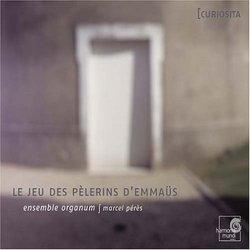| All Artists: French Anonymous, Marcel Peres, Ensemble Organum Title: Le jeu des pelerins d'EmmaŁs (Play of the Pilgrims to Emmaus - a 12th century liturgical drama) /Ensemble Organum * Peres Members Wishing: 1 Total Copies: 0 Label: Harmonia Mundi Fr. Release Date: 5/11/2004 Album Type: Import Genres: Special Interest, Classical Styles: Chamber Music, Historical Periods, Classical (c.1770-1830) Number of Discs: 1 SwapaCD Credits: 1 UPC: 794881738328 |
Search - French Anonymous, Marcel Peres, Ensemble Organum :: Le jeu des pelerins d'EmmaŁs (Play of the Pilgrims to Emmaus - a 12th century liturgical drama) /Ensemble Organum * Peres
CD Details |
CD ReviewsLE JEU DES PELERINS D'EMMAUS (ENSEMBLE ORGANUM) MARCEL PERES Hal F. Smith | North Carolina | 08/07/2008 (5 out of 5 stars) "I will not be as in depth with my review as the last, all I can state is that the copy I have,I purchased in the early 90's. The first time I heard this recording was on one of those Public Broadcasting stations. I spent quite a few hours researching the recording for purchase. Back in the early 90's the internet was still in a infant state... I believe it to be one of the best albums in my personal collection. It opened so many doors into different forms of music for me. I still to this day listen to the entire album on a regular basis, especially around the Easter. I was sorry to hear it is out of print. My cover is more traditional than one portrayed. I have what looks like 3 monks about to enter the open doorway." Marcel Peres on the Road to Emmaus Giordano Bruno | Wherever I am, I am. | 06/12/2008 (5 out of 5 stars) "Marcel Peres is a musical adventurer. No one is likely to dispute that. But the term 'adventurer' has two meanings - the modern sense of someone willing to take chances, to seek adventures; and the Victorian sense of someone seeking opportunities to pounce and exploit. Peres has split the "historically informed performance practice" movement, especially the musicologists, into two camps, obviously the supporters and the scoffers. The basic issue is the degree to which 'conjecture' is appropriate in performance of music about which it's nearly impossible to have any certainty. Peres has been willing to use conjecture and intuition to generate exciting performances, some of which are plausible in the best sense, and some of which are 'kinda far-fetched'.
Le Jeu de Pelerins (the Play of the Travelers) is a liturgical drama of the 11th and 12th Centuries. The stress is on the word 'liturgical.' Such dramas were tropes on the liturgy used by monastics and clergy during the celebration of specific dates in the church calendar. [A trope is an extension of the words and/or music of regular chants, psalms, hymns, etc. - what people think of as Gregorian chant. Thus a harmonization of chant is a trope, an inserted decorative melody is a trope, extras words are a trope. The liturgical dramas are tropes of both words and music inserted into a fixed liturgical context.] This trope was composed in Normandy in the late 11th C, but the existing manuscript was prepared for the cathedral of Palermo under the reign of the Norman King Roger II (1130-1154). It was performed during the Vespers for Easter Sunday, after the Magnificat on the occasion of a procession to the baptismal fonts. Many of the surviving liturgical dramas are essentially processional; this one, describing the encounter of the disciples with the risen Jesus on the road to Emmaus, seems particularly suitable for procession. Marcel Peres and his Ensemble Organum staged Le Jeu des Pelerins, complete with all the proper liturigal context, in 1990, but most of the Vespers chanting is omitted from this CD. What liturgy is included also comes from Norman sources, specifically from the Abbey of St. Evroult. Peres is extremely scrupulous about sources, and he is not inclined toward popularizing spectacle. Costumes and props were seldom a major factor in liturgical dramas, though the splendid robes of religious celebrants in the High Middle Ages turn any performance today into a pageant. Likewise, instruments were almost never included, and they are absent from this CD. The controversy arises from Peres's use of distinctive vocal timbres and elaborate ornamentation of the notes of chant. Many critics accuse him of 'orientalizing' the chant. In fact, his sources of singing style are more concentrated in rural Italy, in the most isolated regions of Sardinia, Corsica, and Apulia. At times he has employed folk singers from those areas to perform concerts of chant in cities of Europe and America. Remember, when you hear the glissandos and fractional pitches on this CD, that Peres intends to create a conjectural soundscape of a performance of specifically Norman-Sicilian chant around 1150 AD. One thing you can be certain of, when you hear Ensemble Organum, is that all chant should NOT sound alike. The notes that are included in this CD are ample, and the texts are fully translated. What can you expect to hear? The voices will sound more nasal, less like classically trained singers, than on most recordings of chant. The solo chants will emphasize that peculiar voice quality, and will sound almost improvisatory in their meandering melodies and abrupt rhythms. This chant does NOT sound like a group meditation in a serene retreat for overworked professionals. The bottom line? You'll either love it or hate it, and immediately find yourself on one side or the other of the controversy over Peres's adventures." |


 Track Listings (16) - Disc #1
Track Listings (16) - Disc #1